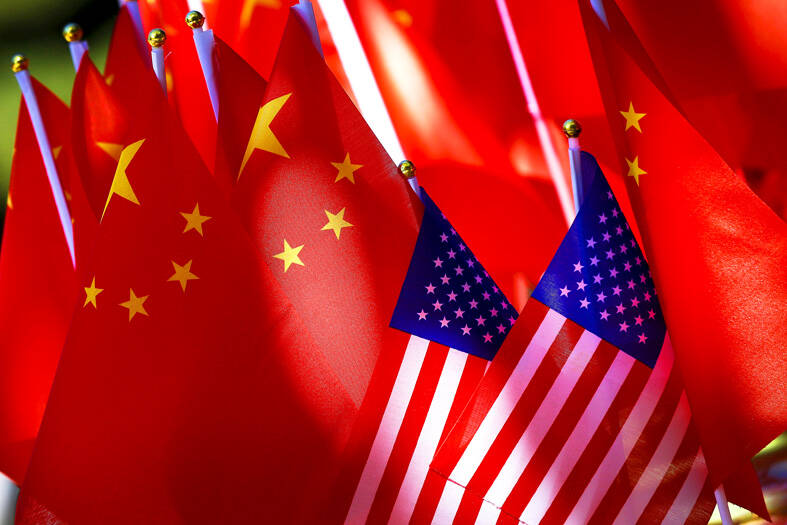US President Joe Biden’s administration believes China has implanted malware in key US power and communications networks in a “ticking time bomb” that could disrupt the military in the event of a conflict, the New York Times reported on Saturday.
The Times, quoting US military, intelligence and security officials, said the malware potentially gave the Chinese People’s Liberation Army the ability to disrupt US military operations if Beijing were to move against Taiwan at some point.
The affected systems could allow China not only to cut off water, power and communications to US military bases, but also to homes and businesses across the US, the newspaper said.

Photo: AP
The report comes two months after Microsoft Corp warned that state-sponsored Chinese hackers had infiltrated critical US infrastructure networks.
Microsoft singled out Guam, a US Pacific territory with a vital military outpost, as one target, but said that malicious activity had also been detected elsewhere in the US.
It said that the stealthy attack, carried out since mid-2021, was likely aimed at hampering the US in the event of a regional conflict.
Authorities in Australia, Canada, New Zealand and Britain warned at the same time that Chinese hacking was likely taking place globally, affecting an extensive range of infrastructure.
Discovery of the malware sparked a series of meetings in the White House Situation Room involving top military, intelligence and national security officials in an effort to track down and eradicate the code, the Times said.
The newspaper quoted one congressional official as saying that the malware operation amounted to “a ticking time bomb.”
The White House issued a statement on Friday that made no mention of China or military bases.
“The Biden administration is working relentlessly to defend the United States from any disruptions to our critical infrastructure, including by coordinating interagency efforts to protect water systems, pipelines, rail and aviation systems, among others,” National Security Council spokesman Adam Hodge said.
He added that Biden “has also mandated rigorous cybersecurity practices for the first time.”

NATIONAL SECURITY THREAT: An official said that Guan Guan’s comments had gone beyond the threshold of free speech, as she advocated for the destruction of the ROC China-born media influencer Guan Guan’s (關關) residency permit has been revoked for repeatedly posting pro-China content that threatens national security, the National Immigration Agency said yesterday. Guan Guan has said many controversial things in her videos posted to Douyin (抖音), including “the red flag will soon be painted all over Taiwan” and “Taiwan is an inseparable part of China,” while expressing hope for expedited “reunification.” The agency received multiple reports alleging that Guan Guan had advocated for armed reunification last year. After investigating, the agency last month issued a notice requiring her to appear and account for her actions. Guan Guan appeared as required,

Japan and the Philippines yesterday signed a defense pact that would allow the tax-free provision of ammunition, fuel, food and other necessities when their forces stage joint training to boost deterrence against China’s growing aggression in the region and to bolster their preparation for natural disasters. Japan has faced increasing political, trade and security tensions with China, which was angered by Japanese Prime Minister Sanae Takaichi’s remark that a Chinese attack on Taiwan would be a survival-threatening situation for Japan, triggering a military response. Japan and the Philippines have also had separate territorial conflicts with Beijing in the East and South China

A strong cold air mass is expected to arrive tonight, bringing a change in weather and a drop in temperature, the Central Weather Administration (CWA) said. The coldest time would be early on Thursday morning, with temperatures in some areas dipping as low as 8°C, it said. Daytime highs yesterday were 22°C to 24°C in northern and eastern Taiwan, and about 25°C to 28°C in the central and southern regions, it said. However, nighttime lows would dip to about 15°C to 16°C in central and northern Taiwan as well as the northeast, and 17°C to 19°C elsewhere, it said. Tropical Storm Nokaen, currently

PAPERS, PLEASE: The gang exploited the high value of the passports, selling them at inflated prices to Chinese buyers, who would treat them as ‘invisibility cloaks’ The Yilan District Court has handed four members of a syndicate prison terms ranging from one year and two months to two years and two months for their involvement in a scheme to purchase Taiwanese passports and resell them abroad at a massive markup. A Chinese human smuggling syndicate purchased Taiwanese passports through local criminal networks, exploiting the passports’ visa-free travel privileges to turn a profit of more than 20 times the original price, the court said. Such criminal organizations enable people to impersonate Taiwanese when entering and exiting Taiwan and other countries, undermining social order and the credibility of the nation’s